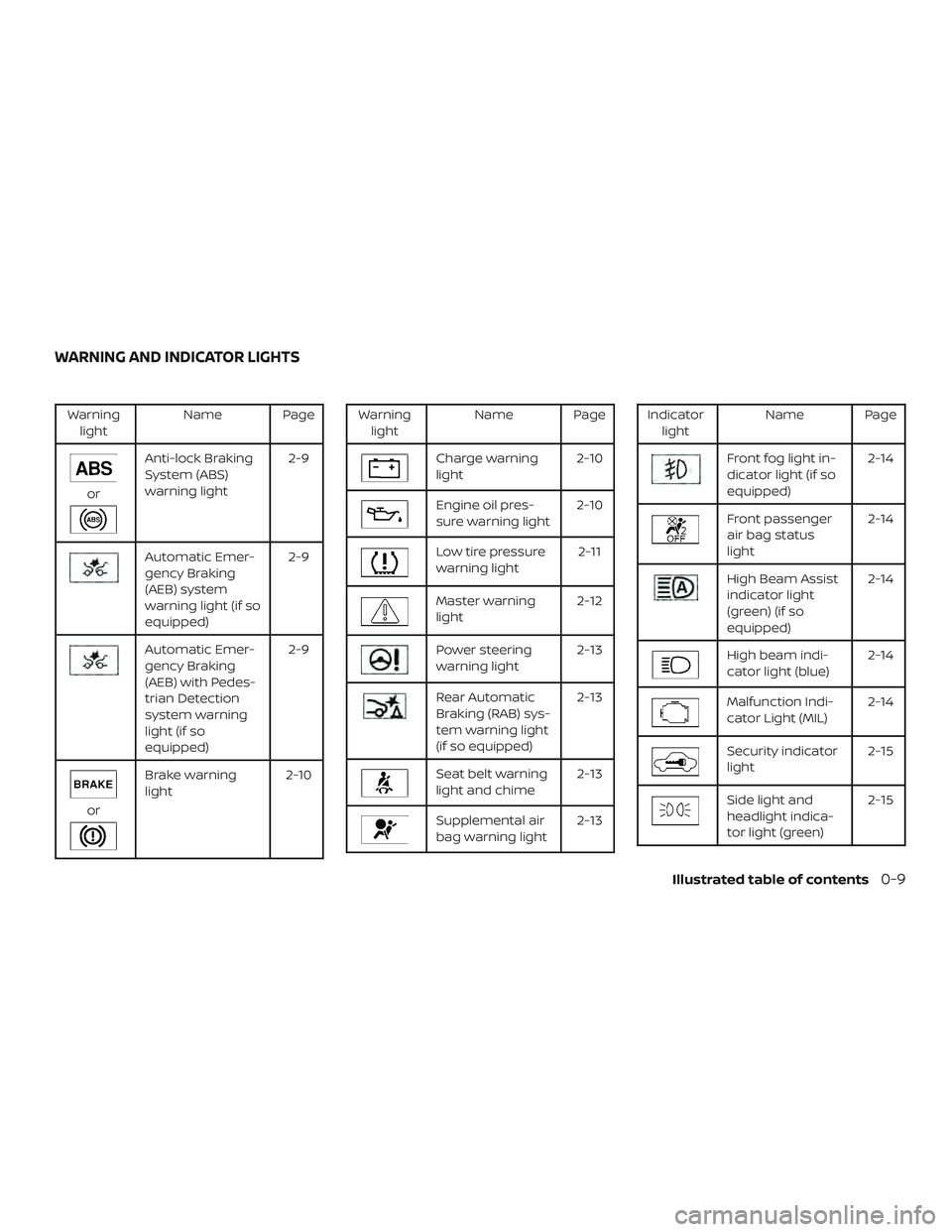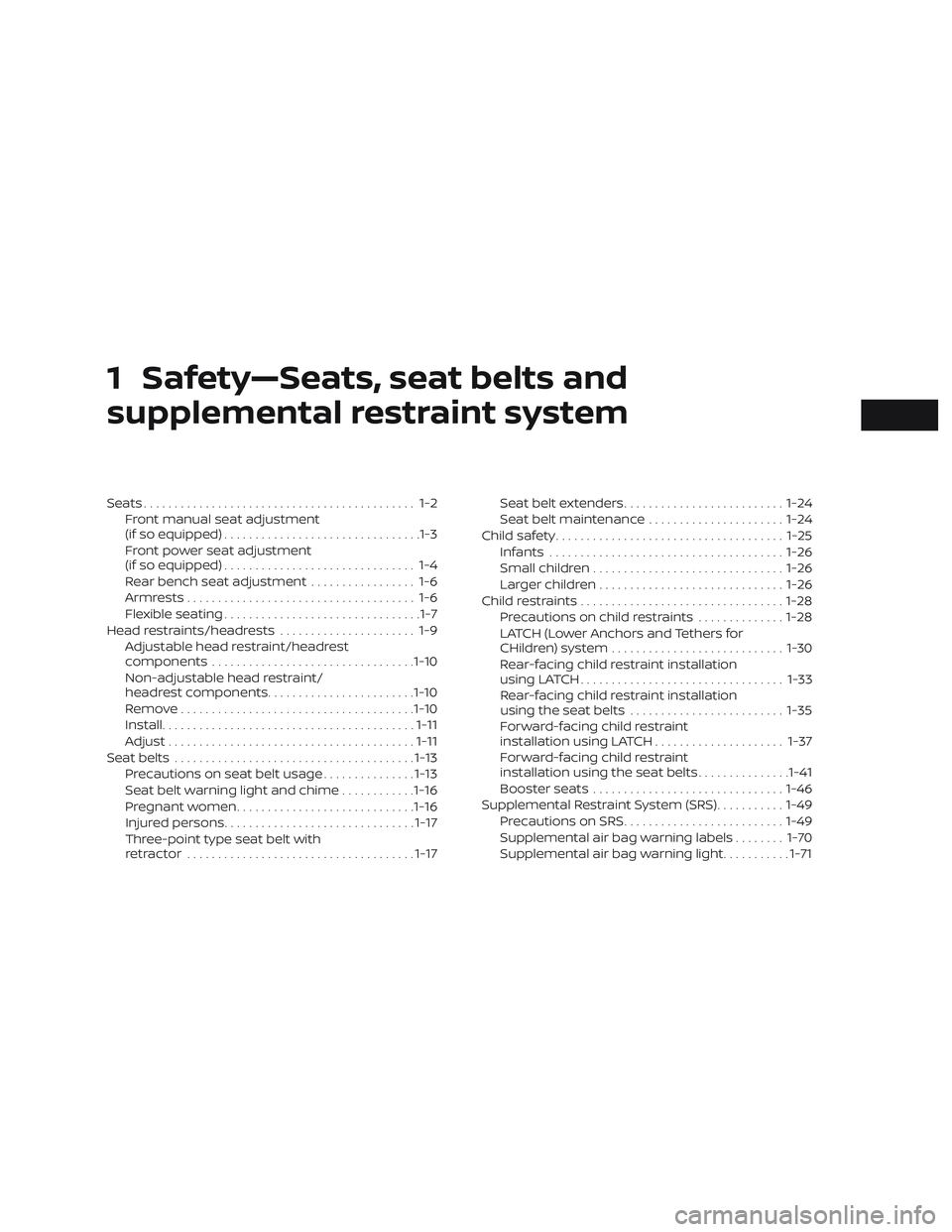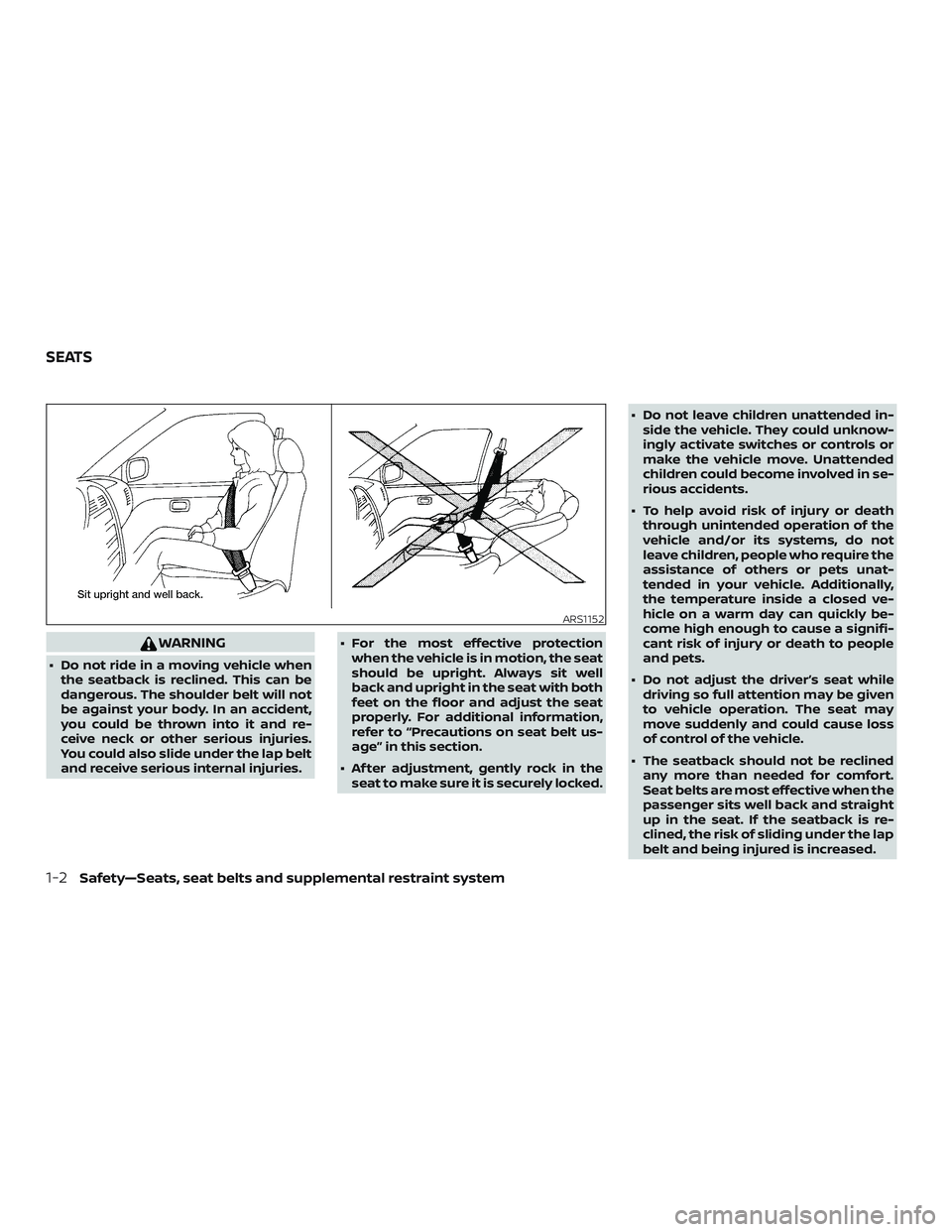2019 NISSAN MURANO warning
[x] Cancel search: warningPage 3 of 507

This manual was prepared to help you un-
derstand the operation and maintenance
of your vehicle so that you may enjoy many
miles (kilometers) of driving pleasure.
Please read through this manual before
operating your vehicle.
A separate Warranty Information Book-
let explains details about the warranties
covering your vehicle. The “Maintenance
and schedules” section of this manual
explains details about maintaining and
servicing your vehicle. Additionally, a
separate Customer Care/Lemon Law
Booklet (U.S. only) will explain how to re-
solve any concerns you may have with
your vehicle, and clarif y your rights un-
der your state’s lemon law.
When you require any service or have any
questions, a NISSAN dealer will be glad to
assist you with the extensive resources
available to them.
In addition to factory-installed options,
your vehicle may also be equipped with
additional accessories installed prior to de-
livery. It is recommended that you visit a
NISSAN dealer for details concerning the
particular accessories with which your ve-
hicle is equipped. It is important that you
familiarize yourself with all disclosures,warnings, cautions and instructions con-
cerning proper use of such accessories
prior to operating the vehicle and/or ac-
cessory. It is recommended that you visit a
NISSAN dealer for details concerning the
particular accessories with which your ve-
hicle is equipped.
Before driving your vehicle, please read this
Owner’s Manual carefully. This will ensure
familiarity with controls and maintenance
requirements, assisting you in the safe op-
eration of your vehicle.
WARNING
IMPORTANT SAFETY INFORMATION
REMINDERS!
Follow these important driving rules to
help ensure a safe and comfortable trip
for you and your passengers!
∙ NEVER drive under the influence of al-
cohol or drugs.
∙ ALWAYS observe posted speed limits and never drive too fast for
conditions.
∙ ALWAYS give your full attention to driving and avoid using vehicle fea-
tures or taking other actions that
could distract you.
∙ ALWAYS use your seat belts and ap- propriate child restraint systems. Pre-
teen children should be seated in the
rear seat.
FOREWORD READ FIRST—THEN DRIVE SAFELY
Page 4 of 507

∙ ALWAYS provide information aboutthe proper use of vehicle safety fea-
tures to all occupants of the vehicle.
∙ ALWAYS review this Owner’s Manual for important safety information.
For descriptions specified for all-wheel
drive models, an AWDmark is placed at the
beginning of the applicable
sections/items.
As with other vehicles with features for
off-road use, failure to operate all-wheel
drive models correctly may result in loss
of control or an accident. For additional
information, refer to “Driving safety pre-
cautions” in the “Starting and driving”
section of this manual.
ON-PAVEMENT AND OFF-ROAD
DRIVING
This vehicle will handle and maneuver
differently from an ordinary passen-
ger car because it has a higher center
of gravity for off-road use. As with
other vehicles with features of this
type, failure to operate this vehicle
correctly may result in loss of control
or an accident.
For additional information, refer to
“On-pavement and off-road driving
precautions”, “Avoiding collision and
rollover” and “Driving safety precau-
tions” in the “Starting and driving”
section of this manual.
MODIFICATION OF YOUR VEHICLE
This vehicle should not be modified.
Modification could affect its
performance, safety, emissions or du-
rability and may even violate govern-
mental regulations. In addition, dam-
age or performance problems
resulting from modifications may not
be covered under NISSAN warranties.
WARNING
Installing an af termarket On-Board Di-
agnostic (OBD) plug-in device that uses
the port during normal driving, for ex-
ample remote insurance company
monitoring, remote vehicle diagnostics,
telematics or engine reprogramming,
may cause interference or damage to
vehicle systems. We do not recommend
or endorse the use of any af termarket
OBD plug-in devices, unless specifically
approved by NISSAN. The vehicle war-
ranty may not cover damage caused by
any af termarket plug-in device.
Page 5 of 507

This manual includes information for all
features and equipment available on this
model. Features and equipment in your ve-
hicle may vary depending on model, trim
level, options selected, order, date of pro-
duction, region or availability. Therefore,
you may find information about features or
equipment that are not included or in-
stalled on your vehicle.
All information, specifications and illustra-
tions in this manual are those in effect at the
time of printing. NISSAN reserves the right to
change specifications, performance, design
or component suppliers without notice and
without obligation. From time to time,
NISSAN may update or revise this manual to
provide Owners with the most accurate in-
formation currently available. Please care-
fully read and retain with this manual all re-
vision updates sent to you by NISSAN to
ensure you have access to accurate and up-
to-date information regarding your vehicle.
Current versions of vehicle Owner’s Manuals
and any updates can also be found in the
Owner section of the NISSAN website at
https://owners.nissanusa.com/nowners/
navigation/manualsGuide
. If you have
questions concerning any information in
your Owner’s Manual, contact NISSAN Con-
sumer Affairs. For contact information, re- fer to the NISSAN CUSTOMER CARE PRO-
GRAM page in this Owner’s Manual.
IMPORTANT INFORMATION ABOUT
THIS MANUAL
You will see various symbols in this manual.
They are used in the following ways:
WARNING
This is used to indicate the presence of
a hazard that could cause death or seri-
ous personal injury. To avoid or reduce
the risk, the procedures must be fol-
lowed precisely.
CAUTION
This is used to indicate the presence of
a hazard that could cause minor or
moderate personal injury or damage to
your vehicle. To avoid or reduce the risk,
the procedures must be followed
carefully.
If you see this symbol, it means
“Do not do
this” or“Do not let this happen.”
If you see a symbol similar to these in an
illustration, it means the arrow points to
the front of the vehicle.
Arrows in an illustration that are similar to
these indicate movement or action.
APD1005
WHEN READING THE MANUAL
Page 11 of 507

0 Illustrated table of contents
Air bags, seat belts and child restraints..........0-2
Exterior front ....................................0-3
Exterior rear .....................................0-4
Passenger compartment ........................0-5 Instrument panel
................................0-6
Engine compartment check locations ...........0-8
Warning and indicator lights .....................0-9
Page 16 of 507

1. Vent (P. 4-26)
2. Headlight/fog light(if so equipped)/turn signal switch
(P. 2-39)
3. Supplemental air bag (P. 1-49) Horn (P. 2-45)
4. Meters and gauges (P. 2-4) Warning and indicator lights (P. 2-8)
Vehicle information display (P. 2-17)
5. Wiper and washer switch (P. 2-36) Rear window wiper and washer
switch (P. 2-36)
6. Audio system/Center display
controls*
7. Hazard warning flasher switch
(P. 6-2)
8. Center display* Navigation display (if so equipped)*
9. Front passenger supplemental air
bag (P. 1-49)
10. Glove box (P. 2-55)
11. Passenger supplemental knee air
bag (P. 1-49)
12. Front passenger air bag status
light (P. 1-49)
13. Power outlet (P. 2-53)
14. USB ports* AUX jack*
LII2574
INSTRUMENT PANEL
0-6Illustrated table of contents
Page 19 of 507

Warninglight Name Page
or
Anti-lock Braking
System (ABS)
warning light 2-9
Automatic Emer-
gency Braking
(AEB) system
warning light (if so
equipped)2-9
Automatic Emer-
gency Braking
(AEB) with Pedes-
trian Detection
system warning
light (if so
equipped)2-9
or
Brake warning
light
2-10
Warning
light Name Page
Charge warning
light 2-10
Engine oil pres-
sure warning light2-10
Low tire pressure
warning light 2-11
Master warning
light2-12
Power steering
warning light 2-13
Rear Automatic
Braking (RAB) sys-
tem warning light
(if so equipped)2-13
Seat belt warning
light and chime
2-13
Supplemental air
bag warning light2-13
Indicator
light Name Page
Front fog light in-
dicator light (if so
equipped) 2-14
Front passenger
air bag status
light2-14
High Beam Assist
indicator light
(green) (if so
equipped)2-14
High beam indi-
cator light (blue)
2-14
Malfunction Indi-
cator Light (MIL)2-14
Security indicator
light 2-15
Side light and
headlight indica-
tor light (green)2-15
WARNING AND INDICATOR LIGHTS
Illustrated table of contents0-9
Page 21 of 507

1 Safety—Seats, seat belts and
supplemental restraint system
Seats............................................ 1-2Front manual seat adjustment
(if so equipped) ................................1-3
Front power seat adjustment
(if so equipped) ............................... 1-4
Rear bench seat adjustment ................. 1-6
Armrests ..................................... 1-6
Flexible seating ................................1-7
Head restraints/headrests ...................... 1-9
Adjustable head restraint/headrest
components ................................. 1-10
Non-adjustable head restraint/
headrest components ........................ 1-10
Remove...................................... 1-10
Install ......................................... 1-11
Adjust ........................................ 1-11
Seatbelts ....................................... 1-13
Precautions on seat belt usage ...............1-13
Seat belt warning light and chime ............1-16
Pregnant women ............................. 1-16
Injured persons ............................... 1-17
Three-point type seat belt with
retractor ..................................... 1-17Seat belt extenders
.......................... 1-24
Seat belt maintenance ......................1-24
Child safety ..................................... 1-25
Infants ...................................... 1-26
Small children ............................... 1-26
Larger children .............................. 1-26
Child restraints ................................. 1-28
Precautions on child restraints ..............1-28
LATCH (Lower Anchors and Tethers for
CHildren) system ............................ 1-30
Rear-facing child restraint installation
using LATCH ................................. 1-33
Rear-facing child restraint installation
using the seat belts ......................... 1-35
Forward-facing child restraint
installation using LATCH .....................1-37
Forward-facing child restraint
installation using the seat belts ...............1-41
Booster seats ............................... 1-46
Supplemental Restraint System (SRS) ...........1-49
Precautions on SRS .......................... 1-49
Supplemental air bag warning labels ........1-70
Supplemental
air bag warning light ...........1-71
Page 22 of 507

WARNING
∙ Do not ride in a moving vehicle whenthe seatback is reclined. This can be
dangerous. The shoulder belt will not
be against your body. In an accident,
you could be thrown into it and re-
ceive neck or other serious injuries.
You could also slide under the lap belt
and receive serious internal injuries. ∙ For the most effective protection
when the vehicle is in motion, the seat
should be upright. Always sit well
back and upright in the seat with both
feet on the floor and adjust the seat
properly. For additional information,
refer to “Precautions on seat belt us-
age” in this section.
∙ Af ter adjustment, gently rock in the seat to make sure it is securely locked. ∙ Do not leave children unattended in-
side the vehicle. They could unknow-
ingly activate switches or controls or
make the vehicle move. Unattended
children could become involved in se-
rious accidents.
∙ To help avoid risk of injury or death through unintended operation of the
vehicle and/or its systems, do not
leave children, people who require the
assistance of others or pets unat-
tended in your vehicle. Additionally,
the temperature inside a closed ve-
hicle on a warm day can quickly be-
come high enough to cause a signifi-
cant risk of injury or death to people
and pets.
∙ Do not adjust the driver’s seat while driving so full attention may be given
to vehicle operation. The seat may
move suddenly and could cause loss
of control of the vehicle.
∙ The seatback should not be reclined any more than needed for comfort.
Seat belts are most effective when the
passenger sits well back and straight
up in the seat. If the seatback is re-
clined, the risk of sliding under the lap
belt and being injured is increased.
ARS1152
SEATS
1-2Safety—Seats, seat belts and supplemental restraint system